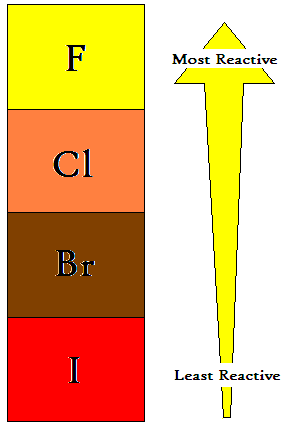Question #4de98
1 Answer
Yes, the reaction will take place because fluorine is more reactive than iodine. A more reactive halogen will displace a less reactive one from its salt.
The reactivity of halogens decreases down a group because atomic size increases down a group.

That happens because, as you you go down a group, the electrons are located in higher energy levels, further away from the nucleus. Likewise, the number of filled shells increases, which means that the added electrons will feel less attraction to the nucleus due to the screening effect the electrons in the shells have.
As a result, the tendency of atoms to form ionic compounds will decrease down group 7, which implies reactivity will decrease as well.
For iodine, which has a much greater atomic size than fluorine, the electrons in the outermost shell will be further away from the nucleus. This will cause the attraction between the nucleus and the electrons in the outermost shell to decrease, which in turn will make an additional electron less easily gained.
Therefore, the reaction will take place

